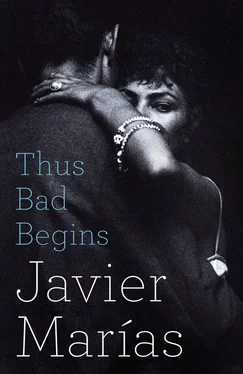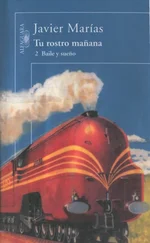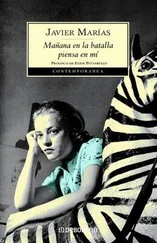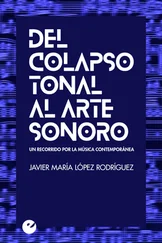‘Is it something to do with the Civil War, Don Eduardo, I mean, Eduardo? Something that your friend did at the time and that you knew nothing about until someone came to you now with the story? Is that what it is?’ And I even dared to be more precise and urge him to explain what he meant. ‘Did he participate in a massacre? Did he carry out summary executions?’ And here I used the expression darle a uno el paseo , literally ‘take someone out for a stroll’, which few young people nowadays would know, but which was still familiar to my generation, because it formed part of the normal vocabulary of both parents and grandparents, and most families had experienced such summary executions during the three years that the War lasted: darle a uno el paseo meant going to someone’s house with a group of other men, either at night or in the early hours or even in broad daylight, bundling him into a car, driving him to the outskirts of the town, to some deserted spot or even to the cemetery walls, where he would be shot in the head or the back of the neck, and his corpse left at the gates of his future home or, more likely, kicked into the gutter; in Madrid or in Seville, in both the Republican and the franquista zones, there were months when not a morning went by without numerous bodies being picked up in the streets, as if they were a new kind of rubbish, too awkward for the road sweepers to deal with, too heavy and difficult to handle, and with a face. ‘Was he one of those Falangists who strutted around with a pistol in his belt? Or a militiaman with a rifle over his shoulder? Did he betray someone as soon as the War was over, denounce people he knew and send them to the firing squad? Was he some kind of butcher, did he commit a lot of murders or order others to do so? What is it you’ve been told, what is it you find so troubling?’
Things had changed a little in that respect, as regards telling people things, although not very much. Adolfo Suárez was in power, the first elected Prime Minister for forty years, Franco having died four or five years before. On the one hand, Franco had been instantly discarded and was seen by most as a kind of dinosaur, and, six months on, the more thinking members of the public were astonished at how little time had passed, because it felt as if entire centuries had gone by since his disappearance. It wasn’t just that one part of the population had longed and hoped and yearned for this, and that in a number of respects — insofar as this was possible — society had, for some time, begun to behave as if he had already gone; what also became clear, even to his supporters, was the extraordinary speed with which he came to be viewed as a complete anachronism, as superfluous: himself, his dictatorship and his Church, to whom he had granted unlimited powers and privileges. On the other hand, incredible though it seemed, we were aware that his regime had withdrawn almost without a murmur (people commented at the time that the regime had committed hara-kiri), obeying the will of the King, which is why we had been granted democracy. We, of course, had not imposed democracy ourselves, because it would not have been in our power to do so without further spillage of the mingled bloods of both sides, which would have ended in certain disaster, although it didn’t take us long to call for more and more freedoms. In those years, though, we were keenly aware that everything hung by a thread, that concessions can always be revoked, that the suicides might well have second thoughts and decide to come back to life, that they had the support of most of the army, who were still franquista to the core and remained in possession of the nation’s only weapons.
One of the conditions for granting us democracy and for that astonishing act of hara-kiri had been an agreement that, to put it bluntly, no one would call anyone else to account. Not for the distant outrages and crimes of the Civil War committed by both sides at the front and in the rearguard, nor for the infinitely more recent crimes committed by the dictatorship, during the seemingly endless thirty-six years of punitive, vengeful rearguard actions, a boom time for their henchmen and a time of humiliation and silence for everyone else. Although it was far from equitable — the losers had been called to account time and again for both real and imaginary crimes — everyone accepted this condition, not just because it was the only way the transition from one system to another could proceed more or less peacefully, but also because those who had suffered most had no alternative and were in no position to make demands. The promise of living in a normal country — with elections every four years, the legalization of all political parties, a new constitution approved by the majority, no censorship — and, one imagined, the rapid implementation of a new divorce bill — with trade unions, freedom of expression and freedom of the press, and no bishops meddling with the law of the land — all of that was far more alluring than the old quest for an apology or the desire for reparation. Both apology and reparation had been so long postponed, and we had so little faith that they would ever appear, that they’d grown worn and frayed in the eternal, never-advancing journey of hopeless hope. The dead were dead and would not return; those who had spent years unjustly imprisoned had lost those years and would never recover them; the subjugated would cease to be subjugated; political prisoners would be amnestied and released with their criminal record wiped clean; those in exile could come home to grow old and die; no one could be arrested or sentenced arbitrarily; we could punish tyrants by not voting for them, ousting them from their posts and stripping them of their privileges, or at least some of them. So tempting was this future that it was worth burying the past — both the old and the more recent — especially if that past threatened to ruin a future that was, comparatively speaking, so good. Many people nowadays have forgotten all this or know nothing about it, either because they don’t remember or because they cannot even conceive of what it means to live under a dictatorship, but to us, who had experienced it at first hand, this promised horizon seemed like an almost impossible dream, and our overriding feeling was one of relief and of great good fortune: we were about to be set free from a totalitarian regime without having to live through any further carnage, and we could at last talk openly about that first time of bloodletting.
And that is what happened, people started talking about the War in broad, historical terms, rather than going into personal or individual details. We accepted the condition and carried it out to the letter, perhaps too faithfully. Under the general amnesty, no one attempted to bring anyone to justice, and this clearly saved us from endless bitter confrontations and accusations and the ever-present possibility of a return of the hara-kiri-ides, although each day that passed pushed them further and further into a ghostly territory from which, by the time they realized what was happening, it was impossible to escape. During those years, therefore, denouncing someone for what they had done during the dictatorship or during the War was unthinkable. Not calling for justice implied a kind of social pact, tantamount to us saying: ‘Fine, let’s just let sleeping dogs lie. If the price we have to pay for a return to normality and for us not to go back to killing each other is that no one calls anyone to account, then let’s just tear up the bills and start again, because, in exchange, we will have, if not the country we wanted, one that comes very close. That, at least, is what we’re seeking, without violence, without prohibitions and without rising up in armed struggle against those who win an election fair and square.’ They were years of optimism and generosity and hope, and I’m quite sure that, at the time, this was the best possible outcome.
Читать дальше












